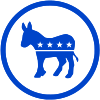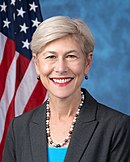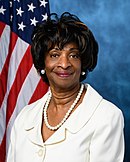|
North Carolina Democratic Party
The North Carolina Democratic Party (NCDP) is the North Carolina affiliate of the Democratic Party. It is headquartered in the historic Goodwin House, located in Raleigh. The party controls the governorship and four other statewide elected offices, as well as seven of the state's 14 U.S. House seats. Since the 2010 passage of the Affordable Care Act, North Carolina Democrats have advocated for increasing the state's minimum wage. History The Second Party System emerged from a divide in the Democratic-Republican Party in 1828. They split off into two groups, the Democrats, led by Andrew Jackson, and the Whigs. In North Carolina, people from the west and northeast supported the Whigs mainly for their policies on education and internal improvements. Meanwhile, eastern North Carolina was dominated by wealthy planters who tended to oppose activist government. During the Civil War, Whigs and Unionist Democrats formed the Conservative Party and elected Zebulon Vance as governor on a platform of supporting the Confederate war effort while defending states' rights and civil liberties against the Confederate government in Richmond.[3] Postwar, the Conservative Party reorganized to oppose the reconstruction policies enacted by the U.S. Congress following the Civil War.[4] By 1870, the two main parties were the Conservatives (who changed their name to "Democratic-Conservatives"[5] and then to Democrats by 1876) and the Republicans.[6] Before the 1960s, many NCDP leaders, as was the case with most state parties in the South, supported racial segregation. But beginning with the Republicans' 1964 presidential campaign and Richard Nixon's "Southern strategy" in 1968, white segregationists, including former U.S. Senator Jesse Helms, flocked to the Republican Party. Since then, most minority voters have supported the NCDP. Jimmy Carter carried North Carolina in the 1976 election, but from 1980 to 2004, the Republican presidential nominee won the state. In spite of the conservative bent of North Carolina politics, a number of Democrats, such as Terry Sanford and John Edwards, have been elected to represent the state at the federal level. Edwards was the Democratic nominee for vice president in 2004. Republican U.S. Senator Elizabeth Dole was defeated for reelection in 2008 by Democrat Kay Hagan, the same year Barack Obama carried the state in his victory over Republican John McCain by a margin of less than one half of a percentage point.[7] Since the passage of the Affordable Care Act, North Carolina Democrats have prioritized advocating Medicaid expansion in the state, a policy that would provide a federally subsidized healthcare plan to approximately 500,000 North Carolinians.[8] Another priority for North Carolina Democrats in the 2010s and 2020s has been increasing the minimum wage.[9] LeadershipThe state party chair is Anderson Clayton, who was elected in 2023. The chair is elected by and leads the State Executive Committee (the "SEC"), a body of more than 500 Democratic Party leaders and activists from all 100 counties, which governs the party. Jonah Garson is the First Vice-Chair, Kimberly Hardy is the second Vice-Chair, Elijah King is the Third Vice-Chair and Melvin Williams is the Secretary.[10] Kian Sadjadi was named Executive Director on November 1, 2023.[11] County PartiesOrganized
Unorganized
NCDP organizations
Recent electoral results2006North Carolina Democrats scored impressive victories in the 2006 general elections, increasing their majorities in both houses of the North Carolina General Assembly and defeating incumbent Republican U.S. Representative Charles H. Taylor. In addition, most candidates backed by Democrats in the non-partisan races for the North Carolina Supreme Court and the North Carolina Court of Appeals were elected. These victories came despite controversies surrounding Jim Black, a Democrat and former Speaker of the North Carolina House of Representatives.[14][15] 2008In 2008, the North Carolina Democratic Party once again earned major victories in state and federal elections. For the first time since 1976, the Democratic nominee carried North Carolina in the presidential election. Meanwhile, Kay Hagan was elected to the U.S. Senate over incumbent Elizabeth Dole, and Beverly Perdue was elected governor to succeed fellow Democrat Mike Easley. 2010In 2010, Republicans swept North Carolina, taking control of both houses of the General Assembly for the first time since 1896, reelecting Richard Burr to a second term by double digits, and unseating incumbent Democratic U.S. Representative Bob Etheridge. 2012Bev Perdue retired as governor and the Democratic nominee for governor, Lieutenant Governor of North Carolina Walter H. Dalton was defeated in the general election by Republican Pat McCrory. Incumbent Democratic U.S. Representative Larry Kissell was unseated, and two open U.S. House seats previously controlled by Democrats were also gained by Republicans. 20142014 saw incumbent Senator Kay Hagan defeated for reelection, and the seat of U.S. Representative Mike McIntyre who had retired was taken by a Republican. Democrats in the North Carolina House of Representatives flipped four seats from Republican held districts in Wake and Buncombe counties. The state party also saw success in the non-partisan races for North Carolina Supreme Court and the North Carolina Court of Appeals. 2016In 2016, Democrats retook the governor's office, electing then-Attorney General Roy Cooper, while also electing a Democrat to succeed him as Attorney General, Josh Stein. Meanwhile, Democrats lost seats in the North Carolina Council of State, picked up one seat in the state House[16] and lost one seat in the state Senate.[17] Democratic nominee Deborah K. Ross lost the U.S. Senate election to incumbent Richard Burr. Democrats retook the majority on the North Carolina Supreme Court for the first time in the 21st century. 2018In 2018, Democrats added a seat to their judicial majority on the North Carolina Supreme Court when Anita Earls defeated Incumbent Republican Justice Barbara Jackson and lawyer Chris Anglin winning by a plurality vote of 48.79%. Democrats also gained two seats on the North Carolina Court of Appeals and incumbent judge John S. Arrowood ran for his first full term after being appointed by Governor Roy Cooper in 2017. Legislative Democrats were able to break the Republican supermajority's in both the State House and Senate for the first time since losing control of both chambers in 2010. 2020In 2020, Democratic governor Roy Cooper won reelection. 2022in 2022, Democrats flipped the redrawn 13th district from Republican control, and won the newly created 14th district, yielding an even 7—7 House delegation. Republicans won a narrow majority in the NC house by 2 new seats, and a smaller majority in the senate also by 2 new seats. In the state's supreme court Republicans won both seats on the Supreme Court and all four races for the Court of Appeals. As a result of these elections, Republicans holds a 5–2 majority on the North Carolina Supreme Court.[18][19] Current elected officialsMembers of CongressU.S. Senate
Both of North Carolina's U.S. Senate seats have been held by Republicans since 2014. Kay Hagan was the last Democrat to represent North Carolina in the U.S. Senate. First elected in 2008, Hagan lost her bid for a second term in 2014 to Republican challenger Thom Tillis who has held the seat since. U.S. House of RepresentativesOut of the 14 seats North Carolina is apportioned in the U.S. House of Representatives, 4 are held by Democrats:
Statewide officesDemocrats control five of the ten elected statewide offices: State legislative leaders
State House  There are 48 Democratic State House members as of 2024. Current members are listed below:[20][21]
State Senate There are 20 Democratic State Senators. Current senators are listed below:[22][23]
Mayors
See also
Notes
External links |
|||||||||||||||||||||||||||||||||||||||||||||||||||||||||||||||











